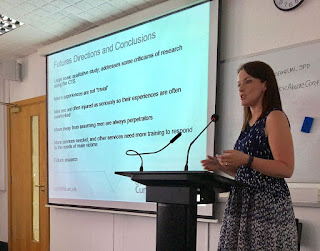Volunteering – why do we keep banging on about it?
 |
| Emma Barton |
“Volunteers are not paid, not because they are worthless,
but because they are priceless” (Unknown)
If you are a current or past student, you will have heard us talking about the importance of volunteering. If you are a new student, don’t worry, you will hear all about this very soon!
So, why is it so important? You’re going to graduate with a shiny new BPS accredited degree in psychology (whichever pathway you have chosen) and you’ve been working since you were 14, so why on earth would you also need to do some volunteering? Here’s why!
Volunteering gives you valuable experience relevant to working as a psychologist – experience which you are very unlikely to be able to gain via any other route as an undergraduate. Your fabulous degree will open doors for you to apply for graduate level jobs and postgraduate education and training. Where competition is fierce for those places though, you will need to be able to demonstrate that you have something more, something which will make you stand out from all the other graduates who will be applying. This is where volunteering comes in. Not only can you then demonstrate that you have relevant skills and experience, you can demonstrate what a hard-working, committed, and dedicated individual you are because you have done this work using your own initiative and without pay.
If you want to be a clinical or counselling psychologist, you can gain experience working with clinical populations. You could be supporting people with mental health issues, bereavement, or difficulties with substance abuse. You might be acting as an advocate or as support for someone with learning difficulties, a disability, or an older person who has mobility issues and needs someone to talk to.
If you want to be a forensic psychologist, you can gain experience working with people who are in the criminal justice system. That might include working with the youth offending service, perhaps being involved in the referral order process, or supporting a young person. You might be working with the probation service, supporting someone who is completing their probation, or acting as a support for someone who might otherwise be at risk of reoffending.
If you want to be an educational psychologist, or perhaps work within CAMHS, you might want to gain experience by working with young people who have mental health and behavioural issues, or learning difficulties. You could support young carers, or children and families from less privileged backgrounds.
If you want to work as an organisational psychologist, you could work as a mediator, or as an adviser for citizens advice. If you are interested in the military, you could work as a support for veterans.
If you are not sure what you want to do, or you are torn between a couple of routes, volunteering gives you the opportunity to try those roles on for size. I’ve done just that myself, as have other students, and it is surprising how many plans change, either because the reality does not match the expectation, or because someone finds a role they hadn’t previously considered but that they really love.
Having spent time over the past few weeks researching the current volunteering opportunities, and talking to the organisations we have in Carlisle and throughout Cumbria, I can tell you with absolute certainty that every one of the suggestions I have made here refers to a volunteering opportunity which is available and open to undergraduate students right now. A few of them might require you to have your own transport but most are easy to get to on foot or via public transport. Almost all of them will reimburse any expenses you have (such as transport costs). All of them provide full training and support for your role and, in the supportive roles, you will also engage in the supervision process. You might already know exactly what you want to do and who to contact. Or you can come and talk to me if you want to get involved but aren’t sure where to start. I’ve got a great big list of organisations, potential roles and key contacts to help the discussion – and I would very happy to help get more students involved in volunteering!
Volunteering will make you more employable. Some volunteering roles lead to paid roles within the same organisation. Perhaps more importantly, it will also give you some other very valuable things – new experiences, opportunities to apply your learning, and gain a much clearer understanding about how what you learn about in the classroom translates into real life practice. You will meet new people, make new friends, and develop as a person, as well as a professional. You will absolutely be making a real difference to people. I love my job but I still volunteer – because it is so very rewarding. I’m no selfless saint, I get something very important from my volunteering – I make a real difference, I feel good about what I do, and I am valued by the organisation I volunteer with and by the people I support and their families. I work supporting people who really need it and who would not be able to access that support except through the charity.
If you are one of our current students then please contact Emma on Emma.Barton@cumbria.ac.uk to talk about volunteering. Alternatively, you can look on the UCSU volunteering site for current volunteering opportunities.
Otherwise, you can check do-it.org for volunteering opportunities near you.


Comments
Post a Comment